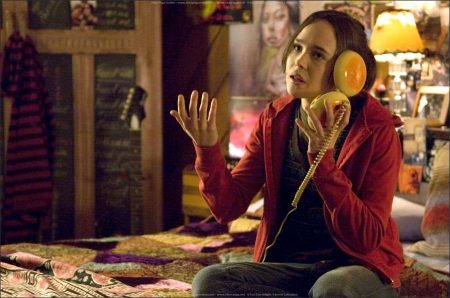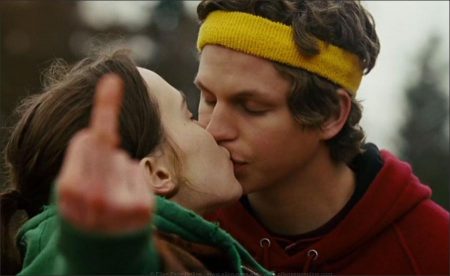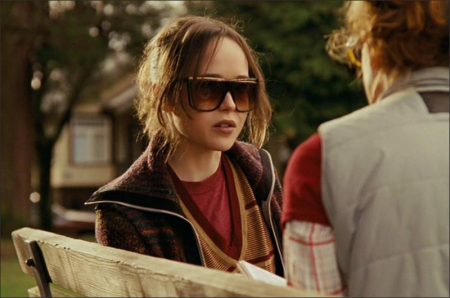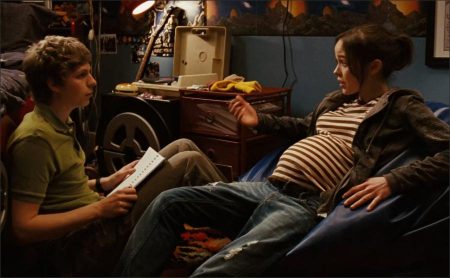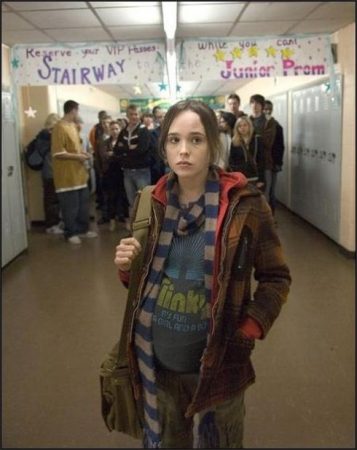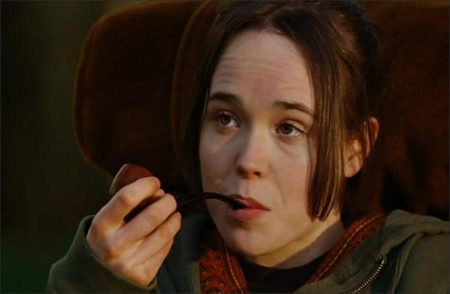Juno stars Ellen Page as the title character, a whip-smart teen confronting an unplanned pregnancy by her classmate Bleeker (Cera). With the help of her hot best friend Leah (Thirlby), Juno finds her unborn child a “perfect” set of parents: an affluent suburban couple, Mark and Vanessa (Bateman and Garner), longing to adopt. Luckily, Juno has the total support of her parents (Simmons and Janney) as she faces some tough decisions, flirts with adulthood and ultimately figures out where she belongs.
Born in the imaginative mind of novelist-turned – screenwriter Diablo Cody, Juno is a unique character unlike any of her screen peers from coming of age films in the past. She’s frank yet funny, charming yet self-confident. Whether sharing with Leah intimate details of losing her virginity or breaking the news of her pregnancy to her parents, Juno commands attention with her brutal honesty and sharp tongue.
After being pressed to write a screenplay, Diablo did a survey of recent teen films and found there was an opening for a little girl with a big attitude. “I was sitting in my house in Minnesota and I was thinking to myself, what’s a story that I haven’t seen,” detailed Diablo. “So much of the stuff I was watching was totally derivative.”
Putting Juno on the page took Diablo back to a place she had experienced in her own youth. “It was incredibly natural,” Diablo said of pulling together the pieces of the story and the nuances of each character. “It was like breathing. I did see Juno as an extension of myself.”
Not to mention an extension of the conversations and situations she saw while growing up. Part of the film’s appeal is the frank and funny dialogue Juno and her friends have about sex, inspired in part by Diablo. “My friends and I were like Juno and Leah. We talked about sex all the time. That was an actual discussion I had with a friend of mine when we were 16.”
Sex aside, there is more to Juno than the underage action that gets her pregnant in the first place. For the film’s talented star Ellen Page, Juno is an atypical teen. “The part of Juno is an extremely well-written teenage girl, which is not the easiest thing to find. She is honest but original, completely devoid of stereotype, which is the most fantastic thing for an actress. My work is really just about connecting to her and trying to make her way of speech and her dialogue — and her relationships–authentic. I’ve found that comes through when you trust the people you’re working with, and you just dive into it.”
JUNO would not have made it to the page in the first place if it hadn’t been for the team of filmmakers who worked tirelessly to bring her to the big screen. It started with producer Mason Novick who, while surfing the Internet, discovered an Internet blog penned by Diablo Cody. He was immediately struck by her humorous writing, hailed for its singularly feminine, ultra-contemporary and utterly candid nature. “As a movie producer I read a lot that is supposed to be funny but is usually pretty terrible,” Novick explained. “So every day for about six months I read her blog, and every day it made me laugh. So, I called her out of the blue, and said, ‘hey, I’m a producer, I live in Los Angeles, I read your blog every day and it makes me laugh. Have you ever thought about writing a screenplay?’ And she said, ‘I’ve thought about it, but I’ve never, you know, never really done it.’”
But what she had already done is write a memoir titled “Candy Girl: AYear in the Life of an Unlikely Stripper.” The two discussed the tome and Novick sent a “Candy Girl” draft to a New York book agent who in turn sold it to Gotham Books. “By then we were talking about Diablo adapting CANDY GIRL for the screen,” Novick recalls, “and I pointed out that she would need a sample screenplay so the studios could see that she could do it. A couple of months later she called and said ‘The sample scrip’s ready,’ and she sent me JUNO. I read it in one sitting and I was blown away. The script we are shooting today is pretty much the script I read back then, which almost never happens. The heart of the story and the characters just all popped off the page.”
Novick brought the project to Mandate’s creative executive Jim Miller in May, 2005 and it was the recognition that this was a screenplay of extraordinary originality that spurred the commitment of Mandate Pictures’ Joe Drake and Nathan Kahane through all stages of production. It was Kahane, who along with Drake and Novick, brought the project to Mr. Mudd Productions’ Lianne Halfon, Russell Smith and John Malkovich, whose previous work on GHOST WORLD seemed to make them a perfect match to Diablo’s similarly distinctive voice.
Together, Mandate, Novick, and Mr. Mudd joined forces to find a director who would be the perfect complement to Cody’s screenplay, in the kind of exhaustive search usually reserved for casting an actor in a lead role. Finally, in August, 2006 Jason Reitman was brought on to direct.
“We were approached by Mandate because they knew they had something special in the screenplay. And they wanted producers that would keep that intact on the screen,” said Lianne Halfon. “Though studios were wowed by Diablo’s script, they were leery of the subject matter and a director’s ability to render that story with the necessary authenticity and emotion. We met fifty directors looking for the right match and when we met Jason, it was immediately clear we’d found the right person.”
“The decision to work with Jason was easy. His passion for the project was immense. What we discovered was a funny, soulful filmmaker who was wildly talented,” says Mr. Mudd partner Russ Smith. Kahane stated, “Diablo’s voice was one that resonated deeply with all of us at Mandate, and Jason’s leadership from script to screen fulfilled the promise of the material.”
Diablo Cody is definitely thrilled that Reitman brought her script to the big-screen. “I didn’t expect it,” she said, “which is why I was so incredibly thrilled when I heard he was interested, because THANK YOU FOR SMOKING showed what a talented, self-assured filmmaker he is. I just knew that when I handed this over I was going to feel this wonderful sense of security, and that’s been the case. I don’t know what appealed to him about this script, but I’m really glad that it did.”
Novick concludes that the film is ripe with feelings and situations that are very current and relevant in today’s world. “Diablo really taps into how kids talk, and how grownups talk around kids, and she nails specific characters in their own worlds without it ever feeling phony. I think it’s her voice that makes JUNO a teen movie that doesn’t talk down to teenagers.”
Casting is always a crucial component of successfully translating a script to the silver screen. With JUNO, the filmmakers had a tough task of finding the right actress to step into Juno’s narrowly complex shoes. The fit had to be perfect for audiences to not only know who she was but also to welcome her– flaws and all–with open arms. Reitman knew that Ellen Page–known to indie audiences for her ferocious performance opposite Patrick Wilson in the controversial HARD CANDY – was the right choice for such a major challenge. Even if she makes it look easy.
“When you have great actors you want to get in there and let their faces tell the story. Ellen in particular does unbelievable, subtle little things with her face. I can give her 120 notes on each take and she hits all of them perfectly,” Reitman explained.
“A lot of actors are good mimics, or they are method actors and do a lot of research, or they are naturally very charming,” noted Reitman, while comparing Page to Meryl Streep. “What’s different about Ellen, is that she knows what Juno would do, say or feel at any given moment, and she can turn it on and off like a light switch. It’s incredible to watch.”
Her co-stars unanimously agree. “She’s just a beautiful and incredible actress,” praised Jennifer Garner. “She’s gonna just blow people out of the water; with this and again and again and again and again. She’s going to be a very important actress.”
Another important actress comes to mind when Allison Janney thinks of Page. “She reminds me of a young Audrey Hepburn. There is something beautifully feminine about her and yet she’s playing this incredibly tough, cool character,” she said. “She’s fearless. I’ve just been so impressed with her and I adore her. I wish I got to work with her longer; she’s amazing.”
Jason Bateman concurs that the filmmakers got it right when they gave Ellen Page the part. “The movie sinks or swims based on how interesting Juno is,” he said, “And fortunately they’ve got Ellen Page playing her and so you kind of sit back and watch her and she’s our tour guide. She’s a very non-acting actor and she sets a very, very good and consistent tone and we all take our cues off that.”
It probably helped that Page led the way by falling in love with Juno and letting her character truly affect her. “I wanted to be Juno so badly, I was in awe of her,” Page said before borrowing a bit of Juno’s hip language. “The script rocks…I’m so grateful to be a part of JUNO.”
She’s also thankful for the upward swing her career has seen since HARD CANDY. “I’ve been really, really lucky lately. I’ve gotten to play so many different roles, even just this last year. It’s been great. The opportunities have been amazing.”
Chances are more than likely that her diversity of career choices will continue long into the future. At first glance, the Lorings– Juno’s pick as the lucky pair to adopt her baby–may seem like the cookiecutter suburban couple with two incomes, a beautiful home and respectable values. However, there are underlying characteristics to their stories which only helps to add to their appeal and complexity. For example, Jennifer Garner’s character, Vanessa Loring, is the apotheosis of post-feminist consumerism, a woman who finds power and liberation in her career and measures her success in the acquisition of goods and, even, a child.
“I like that the characters defy convention and are people who make personal, as opposed to political, choices for themselves, just like in real life,” Reitman said. “Feminism has paved the way for Vanessa’s career, but ultimately Vanessa wants to be a fulltime mother,” he said. “I think a lot of women today who want to be mothers are really conflicted between that desire and everything they’ve put into their career.” Although JUNO is a contemporary look at teens, the film also gives two really talented actors, Jennifer Garner and Jason Bateman, the chance to paint an emotionally rich portrait of a couple struggling in a complicated marriage.
The house that Reitman and his team have chosen for the couple, Mark and Vanessa Loring, is located in the gated community of the posh suburban subdivision Glacial Valley Estates, which Reitman establishes with a cheeky montage of drive-by shots of houses that all look the same.
Inside this particular McMansion, the two curved staircases that greet visitors under a vaulted foyer lead to the upstairs bedrooms, one of which serves as Mark Loring’s “special” room, where he messes around with the guitars he used to play in the rock band of his faded youth.
“Mark,” Jennifer Garner observes on a day she and Bateman are shooting inside this house, “is not going to grow up because he does not want to grow up. When Juno enters his life, she makes him realize that he thinks he wants to be with a younger girl, someone he can impress and control. She makes him want to be the kind of guy that a young girl would look up to. But Vanessa is probably only with Mark at this point because all she wants to do is make her marriage work. In the end, I think he’s not really ready to grow up and she definitely already has.”
One decision that is resolved in the movie is the future of Mark and Vanessa’s relationship, complicated by the introduction of Juno into their sweet suburban life. “For a little while longer things would have been fine without Juno showing up and screwing everything up. The fact that Juno is there and is the catalyst for the breakup of this relationship is a good thing– they don’t belong together.”
In terms of casting, the only actor who appears in both THANK YOU FOR SMOKING and JUNO is J.K. Simmons. In SMOKING, Simmons played Nick Naylor’s hardass boss at the Institute for Tobacco Studies and in JUNO he plays another tough character as Juno’s dad Mac. But while Mac seems to have a gruff exterior, he is complemented with an endearing side, which Reitman said reflects the real nature of Simmons.
“Every director has an actor he wants to cast in every movie he makes,” Reitman offers, “and J.K. Simmons is that actor for me. We connect, we speak the same language. He’s made a career playing the guy who said, ‘Mr. President, the missiles are in the air.’ He’s played so many tough guys that casting him as the perfect dad really worked for this one. In real life J.K. is a big teddy bear, a family man, and it was exciting to have the opportunity expose that side of him.”
People who have seen both films will likely notice the importance Reitman places on paternal relationships. SMOKING’s Nick Naylor is deeply concerned about how he appears in the eyes of his son; in JUNO, the title character often finds comfort in the arms of her father.
“My father and I have a wonderful relationship,” said Reitman. “He has shared so many life lessons with me and I am very grateful to him for that. I try to model my life after his. I can’t help that the same dynamic might play into the parent-child relationships in my movies.”
Both Allison Janney, who plays Simmons’ wife and Juno’s stepmother, and Reitman have noted separately that she appeared in two of his fathers’ productions, SIX DAYS, SEVEN NIGHTS and PRIVATE PARTS.
Of Janney Reitman said: “I’m a longtime fan. I loved her in AMERICAN BEAUTY and on THE WEST WING. She can do anything.”
Said Janney, “I saw THANK YOU FOR SMOKING and thought it was amazing. And then I met Jason and instantly loved him. It’s so important for me to get along with a director and sense that we’re on the same page about things. He’s incredibly smart and easy and accessible in a nice way that I found comforting that I thought, ‘Okay, I can work with this guy.’”
Cody has a lot to say about Janney’s character, a stepmom who defies a lot of the cinematic expectations such a role sets up. “I love Allison’s character,” Cody said, “and there’s a rather narcissistic reason she’s in the movie. I myself am a step-mom, and whenever I watch movies with step-parents in them, they always seem to have a contentious relationship with the kids, or they are seen as an obstacle, or in some cases they’re actually evil. But it’s frustrating when I’m watching movies with my step-daughter, who I absolutely friggin’ adore. So I thought to myself, I’m going to write a cool step-mom. She’s still going be a parent, she’s going be firm but loving, and she’s going to be somebody that we ultimately root for.”
Janney notices that, when it comes to the female characters in JUNO, Cody “Covers all the bases. Every kind of woman is represented in this movie. I play a step mom from an earlier generation. Jen Garner’s role represents a contemporary, more feminine character than any other in the movie, I think, a woman who wants a baby, wants a traditional family. And Juno of course is the woman who is growing up at a time when she has all options open to her.”
When asked about the range of women represented in the film, Cody said “I think women often get pigeonholed as these extremely emotional, melancholy creatures, who are here to bring feeling to the world, and that’s bullshit: women are clever, women are funny, women are sharp, and I wanted to show that these girls were human and not the stereotypical teenage girls that we often see in the media, who are just raging, hormonal, catty, image-obsessed bitches.”
To play the roles of Juno’s sidekicks and best friends, Reitman chose up and coming actors Michael Cera and Olivia Thirlby. Their portrayal of Juno’s quirky peers perfectly compliments Page’s refreshingly charismatic performance. Cera shines as Paulie Bleeker, the soft spoken father of Juno’s baby; while Thirlby expertly delivers the script’s sharp wit and youthful energy as Juno’s best friend. “She has some of the best lines in the movie,” Thirlby said, referring to the infamous “food baby” suggestion she makes upon hearing of Juno’s pregnancy. “She’s so much fun and I love being able to play this awesome, fun character.”
For Cera, his role allowed him to act the part of a high school student, something he doesn’t have a lot of experience with in real life. “I was in high school for a year and then I did it over the Internet,” revealed the actor. But his performance grasps the awkward experience of what it’s like to navigate your way through young love. “Bleeker’s just crazy about Juno, she makes him feel better about himself,” Cera said. “He’s obviously blown away by all of this stuff and overwhelmed and concerned with what’s going to happen with them as the pregnancy comes along. But he’s relieved when she finds out she’s going to give it away. His main concern is maintaining their friendship and hopefully making her his girlfriend.”
Both actors credit the films accurate portrayal of teenagers, noting that it makes the performances feel more genuine. Thirlby adds that, “it’s very difficult playing a dumb teenager.” Cera agrees, “It’s true, I always like it a lot more when kids are written smart, you know, it’s just a lot more accurate, I think.”
“The movie has seasons – autumn, winter, spring – that really resonated with me when I read it,” Reitman said, “because they mirror the three trimesters of Juno’s pregnancy.”
When asked about his use of color in the film – the rich burgundy and gold of Dancing Elk’s track uniforms, the foliage in the wide shots that nearly pulsate with the warmth of AUTUMN or the hysteria of SPRING, Reitman points out how color can inform character.
“I used a lot of rich browns, tobacco colors, for some important characters in SMOKING, so as to contrast them against the whitehot whites of Hollywood, a land that was so foreign to Nick Naylor. The liberal senator from Vermont wore green, and so on,” he explains.
Talk of the color palette Reitman has employed for some early scenes in JUNO –“Juno in her little red hoodie, walking through a world of somber greens and browns,” as Reitman puts it – brings him to reveal a rare flash of uncertainty he faced when shooting that scene in which Juno appears to contemplate suicide.
“That was a moment in the screenplay I wasn’t sure about. ‘What is this doing here, right at the beginning of a comedy?’ I’d thought, but when it came time to shoot I knew I had to show total confidence. We needed the right tree and we needed a really, really long licorice rope, so those things got made, but inside I still wasn’t sure. But one idea from Ellen changed everything: she bites through the licorice and all of a sudden it all made sense. One moment Juno thinks her life is over, and then the next she becomes a kid again–and that sets up a lot of decisions she makes in the film. She played it as a girl at end of her rope and then makes people laugh.”
For production designer Steve Saklad, who worked with Reitman on THANK YOU FOR SMOKING, JUNO was a chance to “create the interior spaces of three different sixteen year old kids, create the space for Juno’s off-center, salt-of-the-earth parents who have years of history in every piece of decoration in their house, and to create the world of Vanessa and Mark Loring, knowing that Vanessa has probably read every home design magazine and tried to copy what’s in them as best she could.”
Screenwriter Diablo Cody adds, “I love the music in this film. I think that Ellen Page, as a person, informed a lot about the movie and music. She’s just an interesting personality and such an amazing person, that she couldn’t help but put her stamp on things.”
Costume designer Monique Prudhomme put similar thought into Vanessa and Mark Loring’s wardrobe, particularly as it applied to the first time Juno and her father–and the audience– meets the couple.
“Vanessa’s clothing is simple and very tasteful – but with a certain anal-retentive quality. She is dressed conservatively and with precision, white cuff, collarshe’s very angular. Jennifer Garner has a beautiful jaw, and it’s very interesting to work with, because she brings a certain sternness to the character, especially at the beginning. That’s why we put Jason Bateman in a similar kind of conservative blue sweater, which compliments Vanessa’s: he is being told who to be, someone he doesn’t want to be: this is the conflict of the Loring house. Later, audiences might notice that his clothes get closer to the way Juno dresses.”
When the camera takes you outside, on, say the track at Dancing Elk High, you can almost feel the fresh, cold air in your lungs. As Juno navigates the lunchroom and halls of Dancing Elk High, the camera follows closely behind, creating a sense of claustrophobia, particularly as we get deeper into her pregnancy.
The habits of real-life teenagers informed at least one of Reitman’s choices as JUNO came together. On a location scout at another high school, the filmmaker observed a couple of students hanging out in the hall, sitting inside a trophy case and chatting between classes. The image inspired Reitman to situate Juno and Leah in the same way for a scene that Cody had originally written as a walk-andtalk.
On the day this scene is shot, a visitor notices that the trophy case is not dissimilar to a number of “diorama”- type images that punctuate the end of THANK YOU FOR SMOKING.
Any discussion of the look of JUNO wouldn’t be complete without a mention of the opening title sequence, created by a company called Shadowplay studios. The sequence was put together by hand-painting frames shot with a high-speed still camera and assembling them into a stopmotion animated montage. Shadowplay also created the memorable titles inspired by vintage cigarette packaging for THANK YOU FOR SMOKING.
“I met those guys at a film festival in Japan in which we both had shorts playing,” Reitman said. Their fantastic movie was called THE SKY IS FALLING and we found ourselves sort of touring all the short film festivals as if we were the class of 2000. “I love their work.”
Just as important as the look of JUNO, is its music. The soundtrack to Juno’s life is an essential aspect of the movie whether she is rocking out to Mott the Hoople or proclaiming the legendary status of The Stooges. To create JUNO’s sound there was a huge collaborative effort between Reitman and Page on what music embodied the character.
“When Jason asked ‘What do you think Juno would listen to?’ I basically said The Moldy Peaches, a group whom he had never heard of. I climbed on his computer and played him The Moldy Peaches. The next thing I knew he was in love with them and wanted to put the song in the film,” said Page. “The song that we play at the end of the film actually has been a huge part of my life for years, so it was a pretty amazing moment for me.”
For Reitman, his trust in Page and her ease with the character went a long way in shaping the music of the film. “I think of JUNO as a discovery film. For many people, this film will be their introduction to Ellen Page, Diablo Cody, and The Moldy Peaches–A band I discovered the day Ellen jumped on my computer, downloaded the song ‘Anyone Else But You’, and said ‘This is what Juno would listen to,’” said Reitman “I got a hold of Kimya Dawson (the female singer from the Moldy Peaches) and asked her if she had any further solo work. The response I got was a package with six CDs and over a hundred tracks. I can’t tell you how exciting it is to open an envelope and find your soundtrack.”
Screenwriter Diablo Cody adds, “I love the music in this film. I think that Ellen Page, as a person, informed a lot about the movie and music. She’s just an interesting personality and such an amazing person, that she couldn’t help but put her stamp on things.”
The journey of Juno MacGuff is open to many interpretations. Yet for all the obstacles and moral dilemmas thrown her way, audiences are likely to give in to her unassuming charm and vivacity for life, no matter what viewpoint they take on the issues of teen pregnancy and family. In the end, it is the bond with her family and the choices she makes along the road to self discovery that make Juno such an unforgettable character.
Writer Diablo Cody said the film should elicit strong feelings about what the movie says on the topic of teen pregnancy. “It is a hot button issue. You can look at it as a film that celebrates life and celebrates childbirth, or you can look at it as a film about a liberated young girl who makes a choice to continue being liberated. Or you can look at it as some kind of twisted love story, you know, a meditation on maturity,” she said, adding that the film’s storyline and character developments go beyond just teen pregnancy. “It raises a lot of questions about love, freedom, marriage and where we’re ultimately supposed to wind up in life.”
While it may raise those questions for some audiences, Allison Janney said it doesn’t force a message down anyone’s throat. “It’s not trying to be political at all. You just have a story about something that happens to a girl in her life and what she decides to do,” said the actress. “It’s not trying to make a statement, which I really like.”
Statement or not, it’s Juno’s journey that is the most fascinating thing to watch for its lead actress. “She goes on a long, tricky road,” concluded Page. “She has this idea of what it is to be an adult and desire to be that way as I think you are in adolescence–you’re stuck between two worlds. And she comes out on the other end all right.”
Juno (2007)
Directed by: Jason Reitman
Starring: Ellen Page, Michael Cera, Allison Janney, JK Simmons, Olivia Thirlby, Rainn Wilson, Jason Bateman, Jennifer Garner, Kaaren de Zilva, Valerie Tian, Darla Fay
Screenplay by: Diablo Cody
Production Design by: Steve Saklad
Cinematography by: Eric Steelberg
Film Editing by: Dana E. Glauberman
Costume Design by: Monique Prudhomme
Set Decoration by: Shane Vieau
Art Direction by: Michael Diner, Catherine Lehman
Music by: Mateo Messina
MPAA Rating: PG-13 for mature thematic material, sexual content and language.
Distributed by: Fox Searchlight Pictures
Release Date: December 5, 2007
Views: 120
